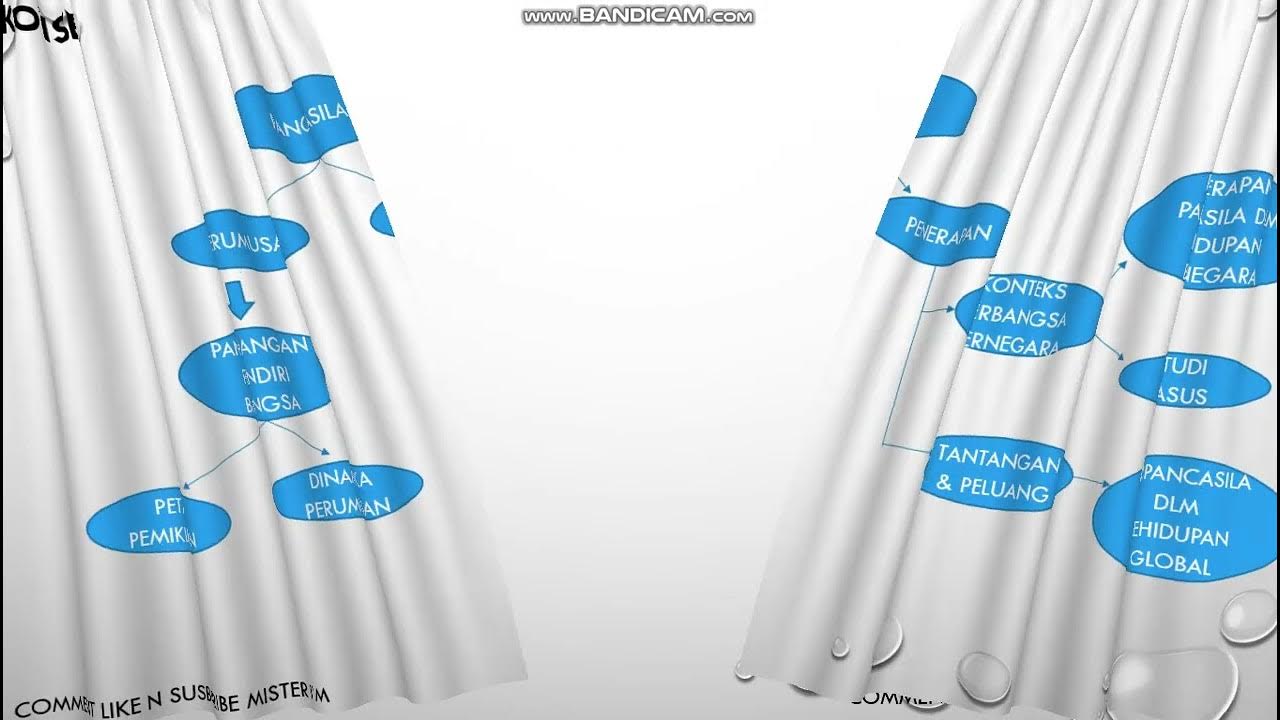Nilai nilai Pancasila dalam Pembangunan Nasional
Summary
TLDRThis educational video focuses on the implementation of the Pancasila values in Indonesia's national development. It explains how the five principles—belief in God, humanity, unity, democracy, and justice—manifest in everyday life, particularly in educational settings. The video emphasizes the importance of these values in building a just and prosperous society. Students are encouraged to identify and reflect on real-world examples of Pancasila values in their surroundings and assess their impact. The content highlights the role of Pancasila in fostering unity, justice, and overall societal well-being, urging students to contribute actively to national development.
Takeaways
- 😀 Pancasila is the foundation of Indonesia's national development and plays a central role in shaping the country's political, economic, and cultural life.
- 😀 As students and citizens, we are encouraged to understand and implement the values of Pancasila in our daily lives to contribute to national development.
- 😀 The first value of Pancasila, 'Ketuhanan,' emphasizes building a mentally and spiritually strong Indonesian character, promoting respect for religious differences.
- 😀 The second value, 'Kemanusiaan,' focuses on upholding human dignity and balancing rights and responsibilities, as well as environmental preservation.
- 😀 The third value, 'Persatuan,' stresses the importance of national unity and prioritizing the nation over personal interests.
- 😀 The fourth value, 'Kerakyatan,' encourages collaboration, democracy, and peaceful resolution of conflicts to ensure the public's interests are prioritized.
- 😀 The fifth value, 'Keadilan,' aims to create a just and prosperous society through fair governance and policies that ensure the welfare of all citizens.
- 😀 An ideal society based on Pancasila guarantees basic needs such as food, shelter, education, healthcare, and security in old age for all citizens.
- 😀 Citizens are given equal opportunities to contribute to society, including preserving and enhancing the cultural heritage of Indonesia.
- 😀 The final assignment encourages students to identify real-life examples of Pancasila values and assess their implementation in their surroundings.
Q & A
What is the main focus of the transcript?
-The main focus of the transcript is the application of Pancasila values in national development, specifically in the context of education and daily life in Indonesia.
What is Pancasila and why is it important for Indonesia?
-Pancasila is the state philosophy of Indonesia, consisting of five principles that guide the nation’s governance, social order, and the behavior of its citizens. It is crucial because it serves as the foundation for the nation’s political, economic, and cultural development.
How is the value of Ketuhanan (Belief in God) applied in schools?
-In schools, the value of Ketuhanan is applied by teaching students to respect religious differences and allowing them to practice their respective religions, such as celebrating religious holidays like Idul Fitri and Christmas together.
What is the significance of the value of Kemanusiaan (Humanity) in national development?
-Kemanusiaan emphasizes the dignity and equality of every person, promoting a balance between rights and obligations. It aims to ensure that national development respects human rights and contributes to global peace.
Can you give an example of how Persatuan (Unity) is practiced in Indonesia?
-An example of Persatuan in Indonesia is students participating in flag-raising ceremonies at school. These activities reinforce national pride and unity, especially during national holidays.
How does the value of Kerakyatan (Democracy) influence daily life in schools?
-Kerakyatan encourages cooperation and collective action. For example, students and teachers work together in planning and organizing school events, fostering a sense of shared responsibility and democratic collaboration.
What is the role of Keadilan (Justice) in the development of a fair society?
-Keadilan aims to create a fair society by ensuring equal opportunities for all citizens, including through government policies such as providing financial aid to low-income families to ensure basic needs are met.
What task are students given at the end of the transcript?
-Students are tasked with finding real-life examples of the application of Pancasila’s values (Ketuhanan, Kemanusiaan, Persatuan, Kerakyatan, and Keadilan) in their surroundings and assessing whether these values are being fully realized.
What are the four key elements that define a just and prosperous society based on Pancasila?
-The four key elements include guaranteed basic needs (food, clothing, shelter), access to health and education, security for the elderly, and the opportunity to contribute to the betterment of humanity.
How does the transcript suggest that students can actively contribute to national development?
-The transcript encourages students to actively observe and reflect on how the values of Pancasila are implemented in their community. It emphasizes that students should support sustainable and fair development efforts in their roles as citizens.
Outlines

هذا القسم متوفر فقط للمشتركين. يرجى الترقية للوصول إلى هذه الميزة.
قم بالترقية الآنMindmap

هذا القسم متوفر فقط للمشتركين. يرجى الترقية للوصول إلى هذه الميزة.
قم بالترقية الآنKeywords

هذا القسم متوفر فقط للمشتركين. يرجى الترقية للوصول إلى هذه الميزة.
قم بالترقية الآنHighlights

هذا القسم متوفر فقط للمشتركين. يرجى الترقية للوصول إلى هذه الميزة.
قم بالترقية الآنTranscripts

هذا القسم متوفر فقط للمشتركين. يرجى الترقية للوصول إلى هذه الميزة.
قم بالترقية الآنتصفح المزيد من مقاطع الفيديو ذات الصلة

Simbol Pancasila Kelas 2 Kurikulum Merdeka #pendidikanpancasila #kurikulummerdeka #kelas2

RANGKUMAN PPKN KELAS 11 SEMESTER 2

BAGIAN 1 UNIT 1 PETA PEMIKIRAN PENDIRI BANGSA TENTANG PANCASILA!! (FASE F)

Materi Pendidikan Pancasila Kelas XI BAB 4 || A. Pentingnya Menjaga Keutuhan NKRI

BAB 5//B.Upaya Mempertahankan Kesatuan dan Persatuan NKRI//kelas 9//

Pendidikan Pancasila Kelas 8 BAB 1 || B. Pancasila sebagai Pandangan Hidup Bangsa dalam Kehidupanku
5.0 / 5 (0 votes)
